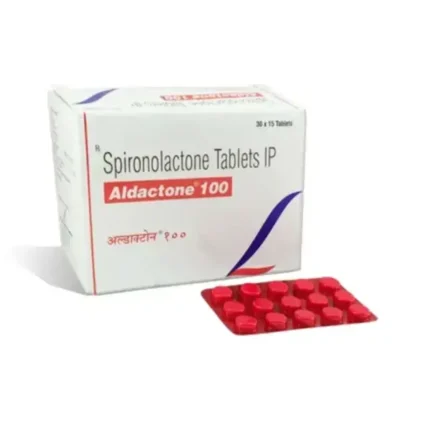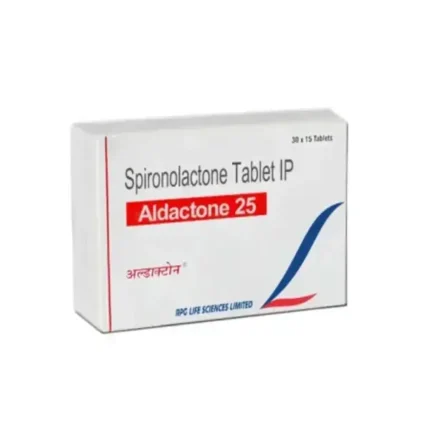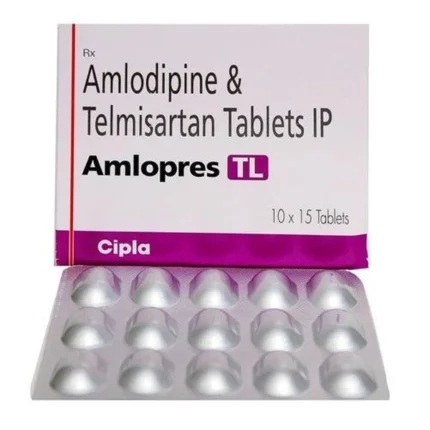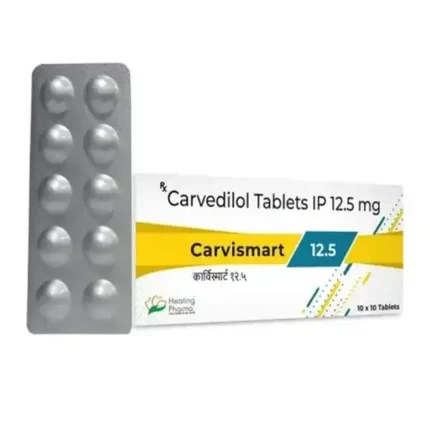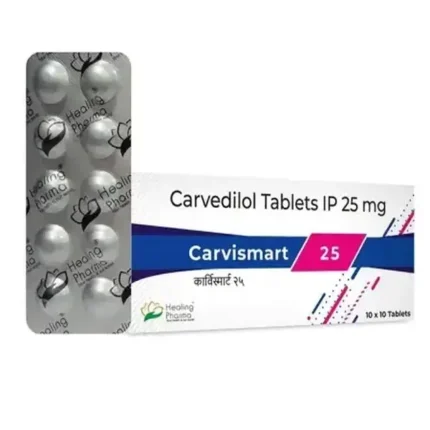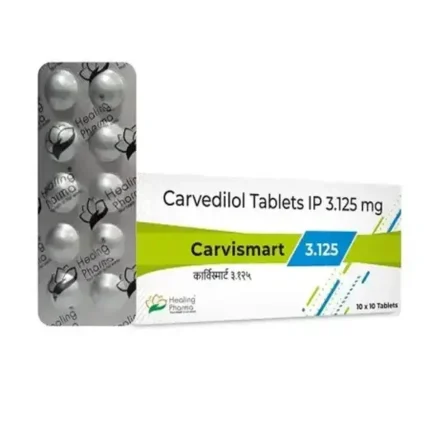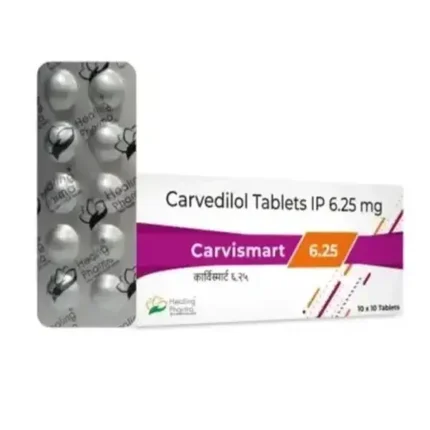Heart Care Medications: Protect Your Heart, Prolong Your Life
Your heart is the powerhouse of your body—and caring for it is vital. With the rising incidence of cardiovascular diseases (CVDs) worldwide, heart care medications play a key role in preventing heart attacks, controlling blood pressure, managing cholesterol, and improving overall heart function.
This guide explores the most trusted heart medications, how they work, common conditions they treat, and how to safely incorporate them into your daily routine.
Aldactone 100 mg Tablet (Spironolactone)
Price range: $72.00 through $171.00Aldactone 25 mg Tablet (Spironolactone)
Price range: $72.00 through $171.00Amlopres TL Tablet (Telmisartan / Amlodipine)
Price range: $30.00 through $130.00Amtas LP Tablet (Amlodipine / Lisinopril)
Price range: $30.00 through $236.00Aquazide 25 Mg Tablets (Hydrochlorothiazide)
Price range: $20.00 through $36.00Carvismart 12.5 mg (Carvedilol)
Price range: $35.00 through $240.00Carvismart 25 mg (Carvedilol)
Price range: $36.00 through $270.00Carvismart 3.125mg Tablets (Carvedilol)
Price range: $33.00 through $228.00Carvismart 6.25mg Tablets (Carvedilol)
Price range: $34.00 through $234.00Why Is Heart Care Important?
Heart disease is the leading cause of death globally. Proper treatment and timely use of heart medications can:
-
Reduce the risk of heart attacks and strokes
-
Lower blood pressure and cholesterol levels
-
Improve blood circulation
-
Help manage heart failure
-
Prevent blood clots
Common Heart Conditions Treated with Medication
| Condition | Description |
|---|---|
| Hypertension (High BP) | Increased pressure in arteries, straining the heart |
| Coronary Artery Disease | Narrowing of arteries due to plaque buildup |
| Arrhythmia | Irregular heartbeat (too fast or too slow) |
| Heart Failure | Heart is unable to pump blood effectively |
| High Cholesterol | Can lead to arterial plaque and blockages |
| Angina | Chest pain due to reduced blood flow to the heart |
| Blood Clot Prevention | Reduces stroke or embolism risk in at-risk patients |
Top Categories of Heart Medications
💊 1. Beta Blockers
-
Examples: Atenolol, Metoprolol, Bisoprolol
-
Use: Reduces heart rate and blood pressure
💉 2. ACE Inhibitors
-
Examples: Enalapril, Lisinopril, Ramipril
-
Use: Relaxes blood vessels, lowers blood pressure
🔒 3. Statins
-
Examples: Atorvastatin, Rosuvastatin, Simvastatin
-
Use: Lowers bad cholesterol (LDL) and prevents plaque buildup
❤️ 4. Antiplatelet Agents
-
Examples: Aspirin, Clopidogrel
-
Use: Prevents blood clots, reduces heart attack risk
🔄 5. Diuretics (Water Pills)
-
Examples: Furosemide, Hydrochlorothiazide
-
Use: Removes excess salt and fluid, lowers blood pressure
⚡ 6. Calcium Channel Blockers
-
Examples: Amlodipine, Diltiazem, Verapamil
-
Use: Dilates blood vessels, improves oxygen supply to the heart
💥 7. Nitrates
-
Examples: Nitroglycerin, Isosorbide Mononitrate
-
Use: Treats angina (chest pain) by improving blood flow
🧠 8. Anticoagulants (Blood Thinners)
-
Examples: Warfarin, Apixaban, Rivaroxaban
-
Use: Prevents strokes and blood clots, especially in atrial fibrillation
Best-Selling Heart Care Medications Online
| Product | Form | Primary Use |
|---|---|---|
| Rosuvas (Rosuvastatin) | Tablets | Lowers cholesterol |
| Atorlip (Atorvastatin) | Tablets | Reduces LDL cholesterol |
| Metolar XR (Metoprolol) | Extended release | Controls blood pressure |
| Ramipres (Ramipril) | Tablets | ACE inhibitor for hypertension |
| Ecosprin (Aspirin) | Tablets | Blood thinner and antiplatelet |
| Clopitab (Clopidogrel) | Tablets | Prevents clot formation |
How Heart Medications Work
-
Control blood pressure to reduce heart strain
-
Lower cholesterol to prevent artery blockages
-
Improve blood circulation and oxygen flow
-
Prevent clot formation in high-risk patients
-
Manage irregular heart rhythms
Tips for Taking Heart Medications Safely
✅ Take your medication at the same time daily
✅ Don’t skip doses—even when feeling better
✅ Monitor your blood pressure and heart rate regularly
✅ Avoid grapefruit juice (may interfere with some statins)
✅ Discuss any side effects with your doctor
✅ Combine medication with a heart-healthy diet & exercise
Potential Side Effects to Watch For
| Drug Class | Possible Side Effects |
|---|---|
| Beta Blockers | Fatigue, slow heart rate, cold extremities |
| ACE Inhibitors | Dry cough, dizziness, high potassium |
| Statins | Muscle pain, liver enzyme changes |
| Diuretics | Dehydration, electrolyte imbalance |
| Antiplatelets | Bleeding, bruising, gastrointestinal upset |
Who Needs Heart Medications?
-
People with diagnosed heart disease or hypertension
-
Individuals with high cholesterol or diabetes
-
Patients recovering from a heart attack or stroke
-
Those at genetic risk of cardiovascular problems
-
Anyone with chronic chest pain or irregular heartbeat
Frequently Asked Questions (FAQs)
Can I stop heart medication if my BP is normal?
No—never stop without a doctor’s guidance. Normal BP means the meds are working.
Can heart medications interact with other drugs?
Yes. Always inform your doctor about all supplements or drugs you take.
Are there natural alternatives?
Some supplements (like CoQ10, Omega-3s) support heart health but can’t replace medication.
How long do I need to take heart medications?
Most are long-term and require continuous use to prevent serious complications.
Conclusion
Taking care of your heart is essential for a long, healthy life. Whether you need to lower blood pressure, control cholesterol, or prevent clots, the right heart care medication can make all the difference.
Explore our wide range of heart care products and take the next step in safeguarding your health—one heartbeat at a time.


